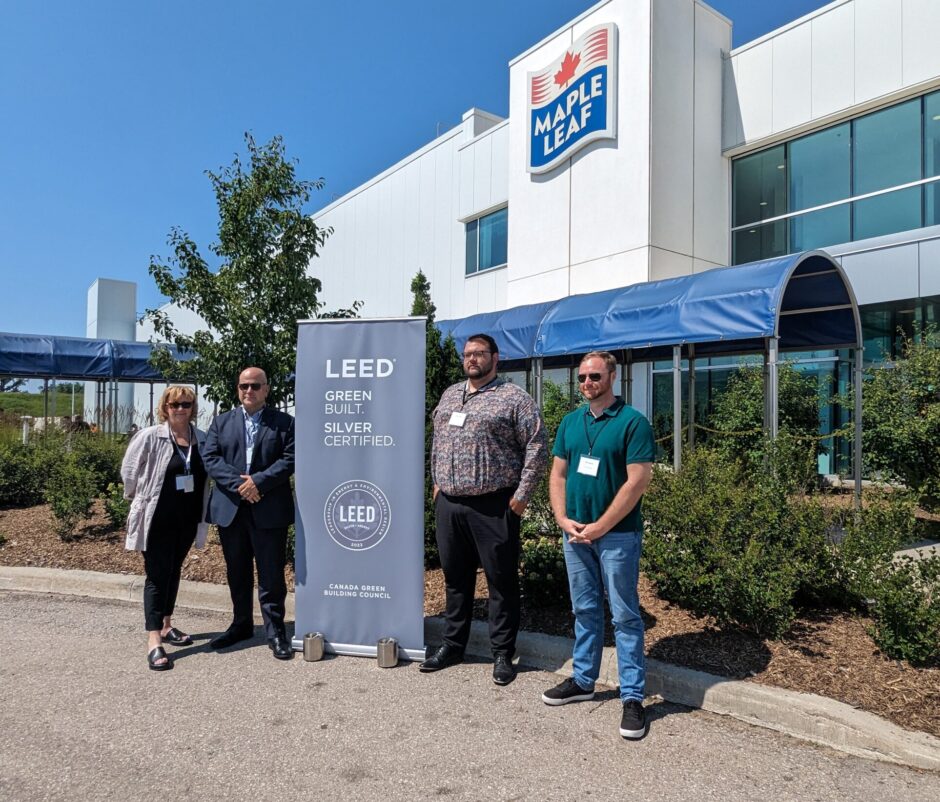The Maple Leaf Foods plant in Hamilton received the Leadership in Energy and Environmental Design (LEED) Silver certification from the Canada Green Building Council.
LEED is an international certification recognizing sustainability excellence and green building leadership.
Maple Leaf officially recognized its certification at an event on Thursday (July 20), which included remarks from the City of Hamilton’s Deputy Mayor and Ward 4 Councillor Tammy Hwang and Ward 11 Councillor Mark Tadeson.
The City’s director of climate change initiatives, Lynda Lukasik was also in attendance, along with Economic Development Office team members (in order, according to the cover photo) Jennifer Patterson, Manager of Business Investment & Sector Development; Norm Schleehahn, Director, Economic Development; Tyson McMann, Business Development Consultant – Agri-Food and Food & Beverage; and Phil Caldwell, Senior Project Manager.
The City’s Economic Development Office identified sustainability and climate resiliency in its most recent action plan.
Randy Huffman, the company’s Chief Food Safety and Sustainability Officer, thanked the City for its support. Maple Leaf received $2.6 million as part of the City’s LEED Grant Program – providing an economic catalyst for sustainable building and land development practices.
“We are really proud of what we have achieved at our Hamilton facility, and deeply appreciate the support we have received from the City of Hamilton,” said Huffman. “It has been a journey to get here, and we look forward to leveraging our learnings as we continue to pursue our vision of being the most sustainable protein company on earth.”
More information on Hamilton’s LEED Grant Program can be found here.
Maple Leaf Foods opened its Hamilton plant in 2014 – also known as its Heritage facility – bringing operations from five other smaller sites into this more efficient and automated facility. It includes approximately 500,000 sq. ft. of floor space and employs more than 900 people who help produce more than 500 products.
Over the past few years, the facility has implemented several initiatives that have led to gradual reductions in Maple Leaf Foods’ environmental impact, including a national LED lighting retrofit program, equipment efficiency and optimization upgrades, ammonia heat recovery and wasted heat recovery systems, composting and recycling programs, control measures and closed-loop systems for water use, and improvements to storage, handling, and employee training to reduce food waste.
Maple Leaf says, since 2014, Heritage has reduced its electricity intensity by 72.9 per cent, natural gas intensity by 47.2 per cent, and water intensity by 54.8 per cent. Meanwhile, since 2015, the plant has reduced its solid waste intensity by 51 per cent and food waste intensity by 45.4 compared to 2016.
Key building features that went into creating this greener facility include measures to encourage alternative transportation, such as a bicycle storage area and the use of low-emitting and fuel-efficient vehicles, optimizing energy performance, enhanced refrigeration management, water use reduction and using low-emitting materials, and maximizing open space to encourage interaction with the environment.
The official press release from Maple Leaf Foods can be found here.
